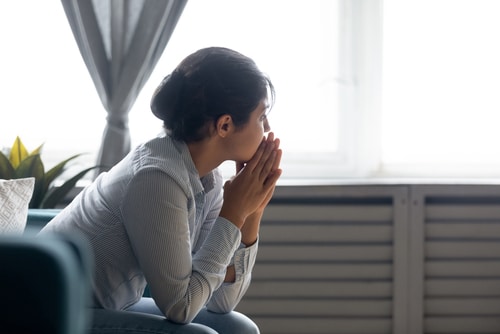If you were given a choice, would you choose to be vulnerable? Would you want to risk being physically or emotionally attacked and hurt? Most people presumably wouldn’t. So, being vulnerable for many feels like it’s too hard.
The fundamental question is not precisely “How can I be vulnerable?”; it’s about how to express it without fear of rejection and enter into it in the healthiest way possible. Vulnerability has a critical role to play in human relationships. It helps us empathize with others and see things from their perspective.
Why Do I Fear Vulnerability?
Being aware that you’re not the only one that’s resisting it is important. Most people fear vulnerability, even those you’ve been hurt by in the past. This is a common human trait, and we’re all dealing with it in our own different ways, whether we’re aware of it or not. Some people may seem extraordinarily confident and strong, like nothing can catch them off-guard, and that’s usually a façade. Many hide their vulnerability deeply and avoid admitting to being hurt or sensitive at all costs.
Nonetheless, we must deal with ourselves first before we start dealing with others and the relationships we have with them. Clearly, the fear of vulnerability is closely related to the fear of rejection, belittlement, or abandonment. We might feel it makes us seem needy, unworthy, and less capable of dealing with life than people around us.
And if we think this badly about ourselves, what will others think? This type of thinking is common, yet deeply misguided. There’s a reason behind the vulnerability we all feel.

Can You Learn To Be More Vulnerable?
Yes. You can learn how to be more vulnerable and need to know how to deal with it. Expressing your vulnerability without fear and accepting the risk of being hurt is the true goal here. Learning to be comfortable – being uncomfortable is key.
If you’ve already had the bad experience of opening up to the wrong people, you might think that being vulnerable and revealing your true feelings and thoughts can only backfire and ruin both your relationship with that person and your sense of self-worth.
People who don’t respond well to the vulnerability of others are often afraid of their own. It could serve as a mirror to them reflecting their own fears. Remember that many people are not prepared to dig through their pain and other feelings that make them feel ashamed, less than, not enough, etc.
However, when it comes to your own journey, there are some steps you can take to become more open about your vulnerabilities:
- Know yourself. Explore your feelings and fears and think about the things that cause you distress. You might not be aware of the underlying reasons behind them. Still, you can discover this with proper expert guidance or by taking the time to think or write about your vulnerabilities.
- Ask for help. If you’re going through a rough patch, you might not be able to deal with revealing your vulnerabilities alone. Instead of isolating yourself and pretending everything’s fine, try to let some people in and let them know how you feel. If you need professional help, don’t be ashamed to admit it.
- Be open about your feelings. This can be one of the most challenging steps – being completely honest about your fears and pain in front of another person. They might not have a solution for your issues, but the feeling of support can also be beneficial.
- Share the moment. Don’t keep it all in while it’s happening. If you’re feeling hurt by somebody’s words or actions, let them know. Their response might surprise you. You may form a deeper bond with people that way and help them open up too.
- Don’t forget about healthy boundaries. Not everybody’s equally prepared to accept their own or the vulnerability of others. Choose the right people to share your feelings with. If you’re getting a distressing response from someone, that’s probably not the right person.
Is Being Vulnerable A Choice Or A Trait?
Even though vulnerability is not a choice, and we’re all born with it, from a purely biological standpoint, being vulnerable doesn’t seem to make much sense. It exposes us to attacks and allows others to harm us physically and emotionally. So naturally, it makes it an uncomfortable choice for many.
However, there’s an incredibly significant role vulnerability plays in our lives. It can help us form better and more meaningful relationships with others. Close, healthy relationships improve our physical and emotional well-being, enrich our lives and make us generally happier and more satisfied with ourselves. In addition, vulnerability helps us feel empathy; without it, fulfilling relationships with friends, family, partners, and children wouldn’t be possible.
Even looking at human babies it’s easy to conclude that, compared to some other primates, they’re much more helpless and dependent on others to survive. This is vulnerability in its purest form. It teaches us that it’s natural to depend on others and have others rely on us. Of course, this doesn’t apply only to babies. We are vulnerable in many other ways throughout our lifetime.
Allowing ourselves to be open about it can influence others to do the same. That way, we can be there for each other, both in challenging times and the good ones. Some of the more common examples of being vulnerable include:
- Being honest and open about your mistakes and shortcomings.
- Sharing things about yourself that you consider profoundly personal and usually keep private with the appropriate people.
- Taking chances, even when they can lead to failure or rejection.
- Allowing yourself to feel and express distressing emotions like fear, shame, or grief.
- Being open and straightforward about what you want in a relationship, what you need to be happy, sharing your expectations, and setting boundaries you’re comfortable with.
Is It Better To Hide Your Vulnerability Or Not?
By accepting our vulnerabilities and finding ways to deal with them, we can use them to our own advantage. It’s a chance to better ourselves and improve our relationships with people who matter in our lives. We can serve as an example to those we care about and help them do the same.
If you choose to work on showing your vulnerability, you can achieve a sense of self-awareness that will, in turn, help you in ways that may be unexpected or seem counterintuitive. Vulnerability can:
- Strengthen your relationships.
- Help other people relate to you.
- Allow you to empower both yourself and others.
- Lead to self-acceptance that drives your emotional growth.
- Make you realize you’re stronger than you thought.
Most importantly, you will learn to love yourself by:
- Embracing your mistakes.
- Realizing that you’re important and worthy of love.
- Stop feeling less deserving and constantly trying to prove yourself.
- Accepting that no single person can satisfy all your needs, and you can’t do that for others either.

PIVOT Can Help You In Becoming Vulnerable And Learning To Deal With It In A Productive Way
Whatever you’ve been taught as a child or unpleasant life experiences, you can’t simply decide whether to be vulnerable or not. We all are – not to the same extent, of course. So instead of suppressing your vulnerability, learn how to use it to make your life and relationships better. The benefits can be truly remarkable.
Embracing vulnerability, and sharing it with people, can help you embrace fulfilling relationships through mutual empathy. The small groups of our Glass House retreats are the perfect setting for exchanging your thoughts and feelings with others, with expert guidance from our PIVOT coaches.
